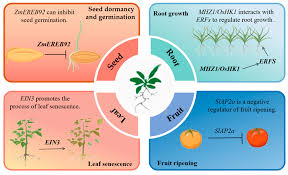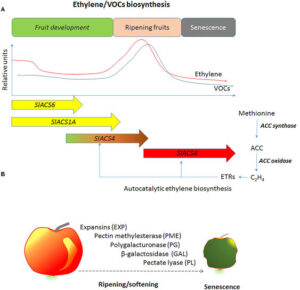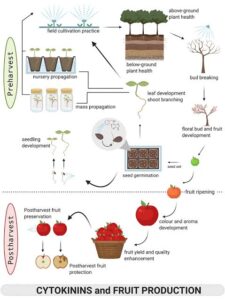Back to: Botany 200 Level
Hello, brilliant learner! Have you ever bought unripe bananas from the market, only to find them soft and yellow after a few days? Or noticed how leaves turn yellow and fall off trees during harmattan? These changes don’t just happen on their own—ethylene, a plant hormone, is at work!
Today, we’ll learn how ethylene helps in fruit ripening and leaf senescence and why it is important for plants and farmers.
Role of ethylene in fruit ripening and leaf senescence
What Is Ethylene?
Ethylene is a gaseous plant hormone that controls many processes in plants, especially those related to fruit ripening, ageing, and shedding of leaves. Unlike other plant hormones that move through the plant in liquid form, ethylene spreads as a gas, affecting nearby plant cells.

Ethylene plays a major role in:
✅ Ripening fruits by changing their colour, texture, and flavour.
✅ Causing leaves to turn yellow and fall off (senescence and abscission).
✅ Helping plants respond to stress, such as drought and injury.
Let’s break these down further.
1. Ethylene and Fruit Ripening
Fruits don’t just ripen by chance—ethylene triggers ripening by causing chemical changes inside the fruit. When fruits like bananas, mangoes, and tomatoes start producing ethylene, they become softer, sweeter, and change colour.
How Does Ethylene Ripen Fruits?
It breaks down starch into sugar, making the fruit sweeter.
It softens the fruit by breaking down cell walls.
It changes green pigments (chlorophyll) to yellow, orange, or red.
It produces aromas and flavours that make fruits more appealing.

✅ Example: If you put an unripe mango next to a ripe banana in a plastic bag, the banana releases ethylene, which helps the mango ripen faster!
2. Ethylene and Leaf Senescence (Ageing)
As plants get older, they need to shed old leaves to conserve energy. Ethylene controls this process, causing leaves to turn yellow, dry up, and eventually fall off.
How Does Ethylene Cause Leaf Senescence?
It reduces chlorophyll, making leaves turn yellow.
It weakens the connection between the leaf and stem, causing the leaf to fall off.
It helps plants remove old and damaged leaves to make space for new growth.

✅ Example: In Nigeria, many trees like mango, guava, and pawpaw shed their leaves during harmattan because of increased ethylene production.
Why Is Ethylene Important?
✔ Helps fruits ripen naturally, making them tasty and nutritious.
✔ Used by farmers to speed up ripening for market sales.
✔ Prevents fruit from over-ripening when stored properly.
✔ Helps plants get rid of old leaves, keeping them healthy.
Summary
Ethylene is a gaseous hormone that controls fruit ripening and leaf senescence.
It makes fruits sweeter, softer, and more colourful by breaking down starch and chlorophyll.
It causes leaves to turn yellow and fall off as part of the plant’s natural ageing process.
Farmers use ethylene to speed up ripening and improve fruit quality.
Let’s Test Your Understanding:
- How does ethylene help fruits ripen?
- Why do leaves turn yellow before falling off a tree?
- How can farmers use ethylene to ripen fruits faster?
Fantastic work, superstar! Now you know how ethylene works its magic in fruit ripening and leaf ageing. Keep learning, and see you in the next lesson!
